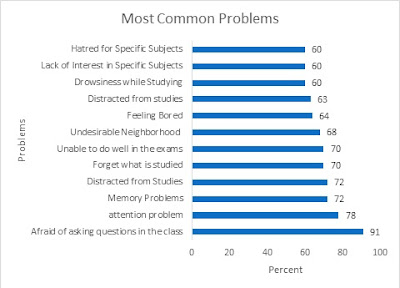JOYFUL STUDYING
A key to enjoying studies
When asked whether they have any
problems, they don't answer at all. But to the question of why their
performance is not up to the mark, they give plenty of reasons and excuses.
They are right because irrespective
of how they score in their exams, students continue to have a lot of problems.
For the last twenty years, I have
been administering to thousands of students a checklist with 100 common problems
related to studying.
On average, they identify around 40
problems out of 100. Out of these 40 problems, around 25 problems stand out and
14 of these problems are directly related to studying.
The following graph summarizes the
percentage of students who have identified each problem.
Students who identified more problems also scored low on
study involvement. Their performance in the class was also found to be much
lower than students with fewer problems.
|
Dimension |
Average
of the Group |
Minimum
Score |
Maximum
Score |
|
Study
Orientation |
19.88 |
11 |
27 |
|
Study
Habits |
35.32 |
25 |
45 |
|
Attitude
towards Study |
3.96 |
1 |
5 |
|
Career
Orientation |
7.92 |
0 |
18 |
|
Classroom
Behaviour |
24.08 |
17 |
31 |
|
Library
Work |
3.36 |
1 |
5 |
|
Speed
Reading |
4.00 |
2 |
5 |
|
Hobbies
and Interests |
19.76 |
12 |
26 |
|
Emotional
Balance |
34.36 |
22 |
50 |
|
Memory
Problems |
-30.60 |
-60 |
-5 |
|
Study
Involvement |
122.04 |
75 |
187 |
Why are students having such
problems?
Let me give a simple example.
Someone who knows swimming can enjoy getting into the water. However, those who
have not learned to swim, suffer in the water.
Similarly, to enjoy studying, we
must learn how to study. Many students think studying is difficult but
difficulties are part of life.
Swimming is difficult but
drowning is also difficult
So, we have to decide which
difficulty we will opt
Students tend to accumulate more
problems as they progress from the lower class to the higher class.
So, what is the solution? Let me
give another example.
Let’s say I purchase a car but I refuse to learn how to drive. I will suffer because I always have to depend on someone else. I can only see others driving and enjoying. I am not only refusing to learn to drive but also refusing to enjoy it.
Let’s say I decide to learn but I say
that I will do it my way because it is my car. True! But I have only bought
the car and not the system that tells me how to drive the car. Though it is my
car, I have to learn how the system works.
For instance, the car's manual says
that I should first start the engine before I do anything else. I will say that
it is my car and I will not start the engine, but I want to drive.
I refuse to use the clutch when
applying gear and I prefer to always go in the top gear. The speedometer says
zero to 180 Km per hour. In case I keep insisting that I will always drive at
180, I will never start the car in the first place.
I have to learn the way the
system works so that I can make the system work for me.
This way, I will not only be able to drive the car but also enjoy driving.
Hence, the solution is very simple.
If I have to drive a car, then I should know how the car functions. If I have
to work on a computer, I should know how the computer functions. Similarly, if
I have to study, I should know how memory functions.
We should work in such a way that
we can record information rather than in a way that is comfortable for us.
First, we have to learn how to
learn so that we can continue to learn. This learning to learn is a major
requirement that we somehow miss in the complexities of the education system.
Rather than training the student in
how to process information, how to store information, and how to retrieve
information, the current education system gives too much importance to the
syllabi.
If you know any student, try to see if you can
find out at least 40 problems in him/her. When you ask them if they have any
problem, they usually deny it. However, when given a checklist of 101 problems,
they start getting insight into what is ailing them, and they willingly tick as
many problems as they can!
The most important question to ask
ourselves is, should we allow the problems to continue? Should we pressurize
the students to score better? Should they do so with a lot of suffering?
Or should we allow them to enjoy
studying by helping them overcome these problems?
Let me know what you think!
JOIN
JOYFUL STUDYING PROGRAM
and Get the following Ebooks FREE
1.
Facing Exams Comfortably2. How to study a difficult subject?
3. Intent Focusing
4. Subconscious Tuning
5. Study Involvement among College Students
6. Facing Challenges through Life Skills














Please do not include any spam links in the comment box.